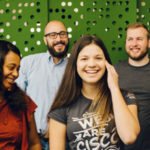 I joined Cisco one year ago in the summer of 2017 as a New Grad Software Engineer. And when I did, people often gave me the same piece of advice: “Take advantage of working at a large established company, you’ll never get better opportunities to grow in your career than this.”
I joined Cisco one year ago in the summer of 2017 as a New Grad Software Engineer. And when I did, people often gave me the same piece of advice: “Take advantage of working at a large established company, you’ll never get better opportunities to grow in your career than this.”
This advice really resonated with me and as soon as I got an email from Connected Women, an Employee Resource Program (ERO), about an Executive Shadow Program, I took a leap. There was an application and two mandatory training sessions to even be considered and only 100 out of the many applications would be accepted. To be honest, I didn’t think there was even a chance a new grad hire would be considered but hey, doesn’t hurt to throw your hat in the ring.

3 months later, I received a congratulatory email with the name of the executive I had been matched with: David Ward, CTO of Engineering and leader of the largest innovation team in the company. Not intimidating at all.
My first meeting with him was a video WebEx call where he asked me what my expectations from the program were. I outlined to him a basic plan with one or two meetings, maybe just over WebEx to learn about his leadership style and Cisco’s strategy from a high level. He looked at me and said simply “That sounds boring. I’m not boring.” And that was the end of that.
Instead, he invited me to come to London with him and his team to attend various meetings with internal and external customers. I couldn’t believe it!
My team, Network Services within the Global Infrastructure Services organization in IT, could not have been more supportive. They helped set up my travel and gave me their blessings before I boarded a plane in June for my first corporate international travel experience.
During my 3 days with David, I learned many lessons about Cisco as a company, the role of a CTO, and how to be the best employee you possibly can. Something that really blew me away was how far Cisco’s reach extends and how much of the world it touches. I think a lot of people underestimate how much Cisco is doing because it’s not a user-facing company. But the truth is that most of the technologies we use today exist because of Cisco’s technology. This completely blew my mind!

Lesson 1: Culture is not just a buzz word
What does it mean to actually build a culture in your team? Dave showed me that culture starts with you. Dave is a smart leader with a clear vision and endless trust and support for his team. He sets, by example, a culture within his team that resembles that of family. Each of them have respect for each other, a passion for their work, and an enthusiasm that’s infectious.
I used to think culture was just a buzzword, a message and a vision that was set forward by a company for “one day”. I learned from Dave that culture wasn’t a future goal but a way to work in the present.
Lesson 2: Innovation First
Dave’s team is the Innovation Team. This team is constantly taking customers’ complex problems and experimenting with different technologies to try to create a working solution. They’re creating the Internet with every project and many times, via methods that haven’t been used before. They have two choices on how to progress with their innovation.
The first is to keep it within Cisco and to revel in the fact that they are the only ones who know how to solve this problem. The second is to publish papers and let the rest of the industry know what’s possible and work with others to solve even bigger societal issues together. David Ward pushes his team to do the latter.
It shows his emphasis on progress and innovation over anything else.

Lesson 3: Networking means building relationships
There were many members of the team that I met that really nailed in on the idea that networking is extremely important. Not just to further one’s own career, but to further your company as well. Establishing and maintaining good relationships with others in the industry can mean new opportunities, partnerships, support, collaboration, etc.
Cisco’s reach extends over hundreds of companies: small, medium, and large and each relationship is important. Every customer is trying to achieve its own goal and Cisco’s role is to ensure that they have the technology and infrastructure to make this happen. Sometimes customers have some not-so-very-nice things to say about Cisco and its products. I learned from David that it’s okay and it only means that we have more feedback on how to make it better. Making sure these companies feel heard and accommodated is important to the Innovation Team because it helps them push the industry forward in a way that makes the most users happy.

This trip changed my outlook on not only Cisco, but what I wanted to do with my career. It helped open my eyes to the innovation happening in the world and the partnerships that make it possible. It helped me see what it meant to be Chief Technology Officer and how human and relatable someone in this seat can be.
I will forever be grateful that I took that first step to signing up for the Executive Shadow Program and that I got paired up with David Ward. He didn’t just show me what’s possible but he taught me to ask for it. At the end of our trip, he asked me if I would have asked to travel with him if he hadn’t offered in the first place. I know I wouldn’t have and by doing so, I would have missed out an experience of a lifetime.
So I leave you with this: How will you challenge yourself to ask for more from your next experience and make the impossible, possible?
Interested in innovating with us? You can! We’re hiring.


What an amazing story! Thank you so much for sharing it, and thanks to David Ward for living the Cisco culture internally and externally.
Great story – thanks for sharing this! In my experience at Cisco I've found the senior execs to be very accessible. I firmly believe that working at Cisco anything is possible – dream big!
That's really awesome — and you've brought us along on your experience so nicely! Thank you for sharing it with us.
This was such an inspiring story to read about, especially from a fellow new grad software engineer! I'm so happy for you and your experiences, and so stoked to see teams and leadership really pushing forward early-in-careers to grow and innovate.
Thanks for sharing! 🙂
Great story, Aditi! Hats off to you as well for jumping right in! 🙂 Well-written blog. Thanks for sharing your experience.
PS- I agree… David Ward is #NotBoring at all. 🙂